Bax Surname Ancestry ResultsOur indexes 1000-1999 include entries for the spelling 'bax'. In the period you have requested, we have the following 161 records (displaying 81 to 90): Single Surname Subscription | | | Buying all 161 results of this search individually would cost £924.00. But you can have free access to all 161 records for a year, to view, to save and print, for £100. Save £824.00. More... |
These sample scans are from the original record. You will get scans of the full pages or articles where the surname you searched for has been found. Your web browser may prevent the sample windows from opening; in this case please change your browser settings to allow pop-up windows from this site. Bengal Civil Servants: Fourth Class
(1857)
The East India Register and Army List was compiled, by permission of the East India Company, from the official returns received at the East India House. The list of civil servants in Bengal presidency is arranged by class of rank, and then by seniority of appointment. The season of appointment is given on the left, then name (usually in the form christian name, initials for middle names, surname) and current position, or if on furlough - except in the case of the appointees of the season of 1856 in the sixth class, where no position is stated, and christian names are given only as initials.BAX. Cost: £6.00.  | Sample scan, click to enlarge

| Deaths, Marriages, News and Promotions
(1857)
Death notices and obituaries, marriage and birth notices, civil and military promotions, clerical preferments and domestic occurrences, as reported in the Gentleman's Magazine. Mostly from England and Wales, but items from Ireland, Scotland and abroad. July to December 1857
BAX. Cost: £4.00.  | Sample scan, click to enlarge
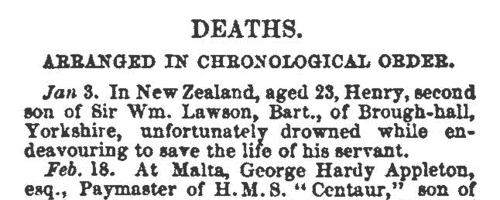
| Indian Mutiny: Killed, Wounded and Escaped
(1857)
This list of casualties of the Indian Mutiny was published 17 September 1857.BAX. Cost: £4.00.  | Sample scan, click to enlarge
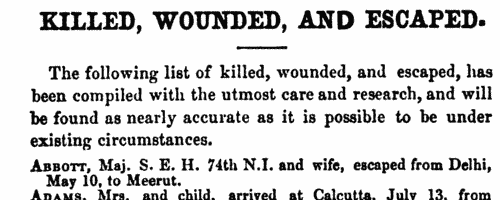
| Masters and Mates of Merchantmen: Certificates of Competency
(1857)
The Mercantile Navy List and Annual Appendage to the Commercial Code of Signals for All Nations, edited by J. H. Brown, was published By Authority in 1857. It includes this full list of 'Masters and Mates who have passed their examination and obtained Certificates of Competency', from number 1 to number 15816, except for those whose certificates had been cancelled. The first column gives the number of certificate; the second column full name, surname first (an asterisk before the name denotes those who are found qualified to act in fore and aft-rigged vessels only; two vertical lines denotes in North Wales fishery only; a double dagger, passed the examination in steam; and a dagger refers to honorary testimonials, details of which are printed at the end of the section. A B C D are the distinguishing letters for the four classes of Meteorological Observers); third column, class examined (1 ex, 1, 2 and 3 denote First Extra, First, Second and Third Class Master's Certificate, granted under the Voluntary Examination, by Order in Council dated August 1845; Ex C, Master Extra; O C, Master Ordinary; 1 M, First Mate; O M, Only Mate; 2 M, Second Mate; L. R. N., Lieutenant Royal Navy; M. R. N., Master Royal Navy; E. I. C., East India Company; M. I. N., Master Indian Navy.); fourth column, year of certificate (where there are two dots, this is to represent a 'ditto' to the year next above); fifth column, Examining Board (Aberdeen, Belfast, Bristol, Cork, Dublin, Dundee, Glasgow, Greenock, Hull, Leith, Liverpool, London, Newcastle, Plymouth, Shields or Sunderland).BAX. Cost: £4.00.  | Sample scan, click to enlarge
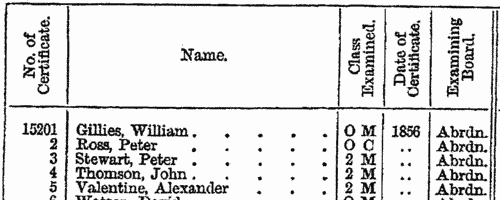
| Boys entering Harrow School
(1859)
This First Volume of the Second Series of the Harrow School Register was edited by J. H. Stogdon and published in 1925. The boys are listed by term of entrance, and then alphabetically by surname and christian names (in bold). Next, in brackets and in italics, is the school house to which he belonged - or, H. B. indicating a day boy whose family lived in Harrow. Stogdon then gives the father's surname and initials, and address. In cases where the boy was prominent in sports at school, or won academic prizes, scholarships &c., that is given; then the year of leaving the school; and a synopsis of his career, so far as known.
BAX. Cost: £4.00.  | Sample scan, click to enlarge
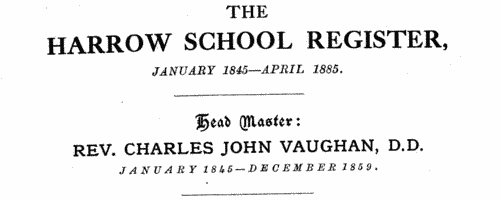
|  Sailors and marines on board Her Majesty's ship Scout
(1860) Sailors and marines on board Her Majesty's ship Scout
(1860)
The China Medal was awarded to soldiers and sailors involved in the various actions of the war against China, in which this ship was engaged in 1860. The medals were either delivered on board or sent on in 1862: except that many of the men were no longer immediately traceable, and the remarks on the roll show that some medals were not sent on for several years, and some were never sent. After the main roll there is a section showing which of the men also qualified for clasps. Separate clasps were awarded for men who had been in receipt of the China Medal of 1842; for the taking of Fatshan in 1857, Canton in 1857, Taku Forts in 1858, Taku Forts in 1860, and Pekin in 1860. Most of the men on this ship are shown as having been given the Taku Forts 1860 clasp, for being actually present at the capture of the Taku Forts 21 August 1860; and the Pekin clasp, for being actually present before Pekin the day the gate of that city was given up to the allied (British and French) army, viz. on 13 October 1860.BAX. Cost: £8.00.  | Sample scan, click to enlarge

| Long-stay Paupers in Workhouses: Dorking
(1861)
This comprehensive return by the Poor Law Board for England and Wales in July 1861 revealed that of the 67,800 paupers aged 16 or over, exclusive of vagrants, then in the Board's workhouses, 14,216 (6,569 men, 7,647 women) had been inmates for a continuous period of five years and upwards. The return lists all these long-stay inmates from each of the 626 workhouses that had been existence for five years and more, giving full name; the amount of time that each had been in the workhouse (years and months); the reason assigned why the pauper in each case was unable to sustain himself or herself; and whether or not the pauper had been brought up in a district or workhouse school (very few had). The commonest reasons given for this long stay in the workhouse were: old age and infirm (3,331); infirm (2,565); idiot (1,565); weak mind (1,026); imbecile (997); and illness (493). BAX. Cost: £6.00.  | Sample scan, click to enlarge

| Masters of English Merchantmen at St Thomas (1862)
The custom house at St Thomas, a Danish colony in the West Indies, issued daily lists of ships entered and cleared, which were published as the Marine Register in the twice weekly polyglot newspaper St Thomae Tidende. The reports of entries give precise date of arrival, nationality, type and name of the vessel (sailing ships in italics, steamships in capitals), the captain's surname (in bold), and whence the ship had come, sometimes adding a brief note about the cargo. The lists of ships cleared for departure have similar details, but with the ship's proposed destination. St Thomas was an important harbour not only serving inter-island Caribbean trade, and trading with England and the north and south American colonies, but also as an entrepot or intermediate destination, ships leaving with goods imported from elsewhere. A large proportion of the shipping was English, virtually all the steamers flying the Red Ensign.
BAX. Cost: £8.00.  | Sample scan, click to enlarge
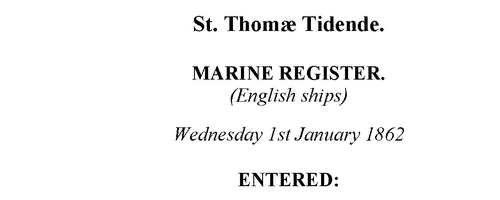
| East Kent Registered Electors: Ash-next-Sandwich
(1865)
The poll for two knights of the shire to represent the Eastern Division of the county of Kent in parliament was taken 18 July 1865, the candidates being Sir Edward Cholmeley Dering, bart., (D), Sir Brook William Bridges, bart., (B), and Sir Norton Joseph Knatchbull, bart., (K). This poll book lists all registered electors, whether they voted or not, by electoral district (Ashford, Canterbury, Dover, Faversham, Hythe, Margate, Ramsgate, Romney, Sandwich, Sheerness, Sittingbourne, Whitstable and Wingham) and then by township or parish within which lay the property whereby the electors had qualified. The lefthand column gives sequential number in the whole volume; then follows the elector's full name, surname first, and his address (often elsewhere); and on the righthand side for whom he voted. When the elector was qualified in duplicate the vote is recorded opposite to the number upon which he claimed to vote at the polling booth, and wherever his name occurs elsewhere a reference is made, immediately after the address, to the number where his vote is recorded, with the initials of the candidates for whom he voted. Duplicate voters who were dead at the time of the election, or did not vote, are printed in italics to signify that they did not vote, or are stated to be dead once only; and wherever the names of such electors occur elsewhere references are made to the numbers where alone they are reckoned in the abstract of the poll as dead or not voting. Whenever a number only, without any other reference, follows the address, it denotes that at the number referred to, the elector is entered as not voting. BAX. Cost: £6.00.  | Sample scan, click to enlarge

| East Kent Registered Electors: Beakesbourne
(1865)
The poll for two knights of the shire to represent the Eastern Division of the county of Kent in parliament was taken 18 July 1865, the candidates being Sir Edward Cholmeley Dering, bart., (D), Sir Brook William Bridges, bart., (B), and Sir Norton Joseph Knatchbull, bart., (K). This poll book lists all registered electors, whether they voted or not, by electoral district (Ashford, Canterbury, Dover, Faversham, Hythe, Margate, Ramsgate, Romney, Sandwich, Sheerness, Sittingbourne, Whitstable and Wingham) and then by township or parish within which lay the property whereby the electors had qualified. The lefthand column gives sequential number in the whole volume; then follows the elector's full name, surname first, and his address (often elsewhere); and on the righthand side for whom he voted. When the elector was qualified in duplicate the vote is recorded opposite to the number upon which he claimed to vote at the polling booth, and wherever his name occurs elsewhere a reference is made, immediately after the address, to the number where his vote is recorded, with the initials of the candidates for whom he voted. Duplicate voters who were dead at the time of the election, or did not vote, are printed in italics to signify that they did not vote, or are stated to be dead once only; and wherever the names of such electors occur elsewhere references are made to the numbers where alone they are reckoned in the abstract of the poll as dead or not voting. Whenever a number only, without any other reference, follows the address, it denotes that at the number referred to, the elector is entered as not voting. BAX. Cost: £6.00.  | Sample scan, click to enlarge

|
Research your ancestry, family history, genealogy and one-name study by direct access to original records and archives indexed by surname.
|













